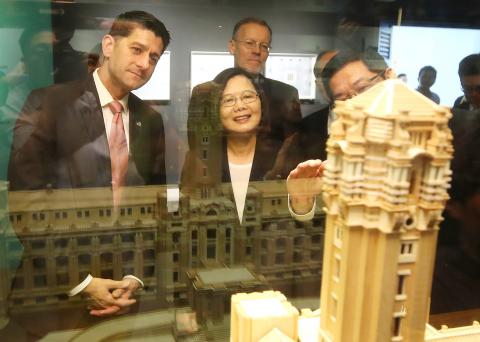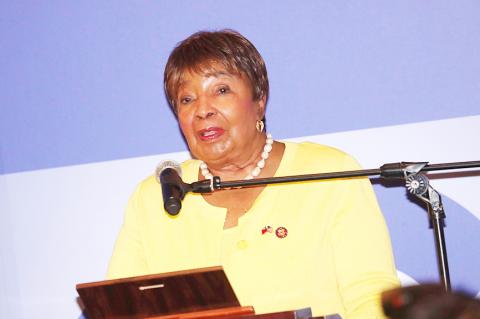The rest of the world should be more like Taiwan, former US House of Representatives speaker Paul Ryan said yesterday at an event at the American Institute in Taiwan’s (AIT) new facility in Taipei’s Neihu District (內湖) to mark 40 years of friendship between Taiwan and the US.
Ryan made the remarks at an afternoon banquet at the AIT compound, which is to officially open on May 6.
The US’ Taiwan Relations Act (TRA), enacted in 1979, was a rarity, as it had “absolute consensus” in Washington, he said.

PHOTO: CNA
“It is this deep, abiding friendship and bipartisanship that is a testament to the enduring friendship between our two countries,” Ryan said, adding that the anniversary of the passage of the TRA serves as a “picture-perfect display” of a wonderful foreign-policy achievement between Taipei and Washington.
The US could not ask for a better friend than Taiwan in its endeavor to carry out a strategy to ensure that freedom and openness flourish in the Indo-Pacific region, said Ryan, who served as House speaker from October 2015 to January.
What the US wants for the Indo-Pacific region is for it to be free, open, prosperous and innovative, and for the rest of the world to partner with the US in solving global problems, he said.

Photo: CNA
“In other words, we want the rest of the world to be more like Taiwan,” he said. “Taiwan actively uses its own experiences not only to help others, but to help others help themselves.”
“The world desperately needs more of Taiwan’s brand of leadership,” he said.
To celebrate the anniversary of the AIT’s establishment and the TRA’s enactment, AIT Director Brent Christensen said a special message of Taiwan-US friendship would be displayed on Taipei 101 to mark the milestone.
The message features a handshake symbolizing Taiwan-US ties and the display was to begin last night and would be shown for two more evenings, the AIT said.
AIT Chairman James Moriarty said in a speech that further progress across the many dimensions of the Taiwan-US partnership can be expected this year, including in the area of expanding people-to-people ties.
“In this regard, we welcome and look forward to exploring Taiwan’s interest in establishing preclearance operations at [Taiwan] Taoyuan International Airport,” Moriarty said.
According to US Customs and Border Protection, preclearance operations would allow US customs personnel to inspect travelers prior to boarding US-bound flights.
The US currently has 15 preclearance officials in six countries.
There is no firm timetable for the establishment of preclearance operations in Taiwan, as the process still requires more dialogue between the two sides, Moriarty told reporters after the opening ceremony at the banquet.
President Tsai Ing-wen (蔡英文) said that in today’s inter-connected world, it is vital that like-minded people move easily beyond their own borders.
“So we are ready, willing and able to work on including Taiwan in the US preclearance program to bring our people closer together,” Tsai said.
US Representative Eddie Bernice Johnson presented Tsai with a framed copy of a congratulatory resolution passed by the US Congress as part of Washington’s celebrations of the anniversary of the TRA’s implementation.
The event was also attended by Minister of Foreign Affairs Joseph Wu (吳釗燮), Taiwan Representative to the US Stanley Kao (高碩泰), Minister of National Defense Yen De-fa (嚴德發) and former president Ma Ying-jeou (馬英九), among others.

INVESTIGATION: The case is the latest instance of a DPP figure being implicated in an espionage network accused of allegedly leaking information to Chinese intelligence Democratic Progressive Party (DPP) member Ho Jen-chieh (何仁傑) was detained and held incommunicado yesterday on suspicion of spying for China during his tenure as assistant to then-minister of foreign affairs Joseph Wu (吳釗燮). The Taipei District Prosecutors’ Office said Ho was implicated during its investigation into alleged spying activities by former Presidential Office consultant Wu Shang-yu (吳尚雨). Prosecutors said there is reason to believe Ho breached the National Security Act (國家安全法) by leaking classified Ministry of Foreign Affairs information to Chinese intelligence. Following interrogation, prosecutors petitioned the Taipei District Court to detain Ho, citing concerns over potential collusion or tampering of evidence. The

Seventy percent of middle and elementary schools now conduct English classes entirely in English, the Ministry of Education said, as it encourages schools nationwide to adopt this practice Minister of Education (MOE) Cheng Ying-yao (鄭英耀) is scheduled to present a report on the government’s bilingual education policy to the Legislative Yuan’s Education and Culture Committee today. The report would outline strategies aimed at expanding access to education, reducing regional disparities and improving talent cultivation. Implementation of bilingual education policies has varied across local governments, occasionally drawing public criticism. For example, some schools have required teachers of non-English subjects to pass English proficiency

NEGOTIATIONS: The US response to the countermeasures and plans Taiwan presented has been positive, including boosting procurement and investment, the president said Taiwan is included in the first group for trade negotiations with the US, President William Lai (賴清德) said yesterday, as he seeks to shield Taiwanese exporters from a 32 percent tariff. In Washington, US Trade Representative Jamieson Greer said in an interview on Fox News on Thursday that he would speak to his Taiwanese and Israeli counterparts yesterday about tariffs after holding a long discussion with the Vietnamese earlier. US President Donald Trump on Wednesday postponed punishing levies on multiple trade partners, including Taiwan, for three months after trillions of US dollars were wiped off global markets. He has maintained a 10 percent

TRADE: The premier pledged safeguards on ‘Made in Taiwan’ labeling, anti-dumping measures and stricter export controls to strengthen its position in trade talks Products labeled “made in Taiwan” must be genuinely made in Taiwan, Premier Cho Jung-tai (卓榮泰) said yesterday, vowing to enforce strict safeguards against “origin laundering” and initiate anti-dumping investigations to prevent China dumping its products in Taiwan. Cho made the remarks in a discussion session with representatives from industries in Kaohsiung. In response to the US government’s recent announcement of “reciprocal” tariffs on its trading partners, President William Lai (賴清德) and Cho last week began a series of consultations with industry leaders nationwide to gather feedback and address concerns. Taiwanese and US officials held a videoconference on Friday evening to discuss the